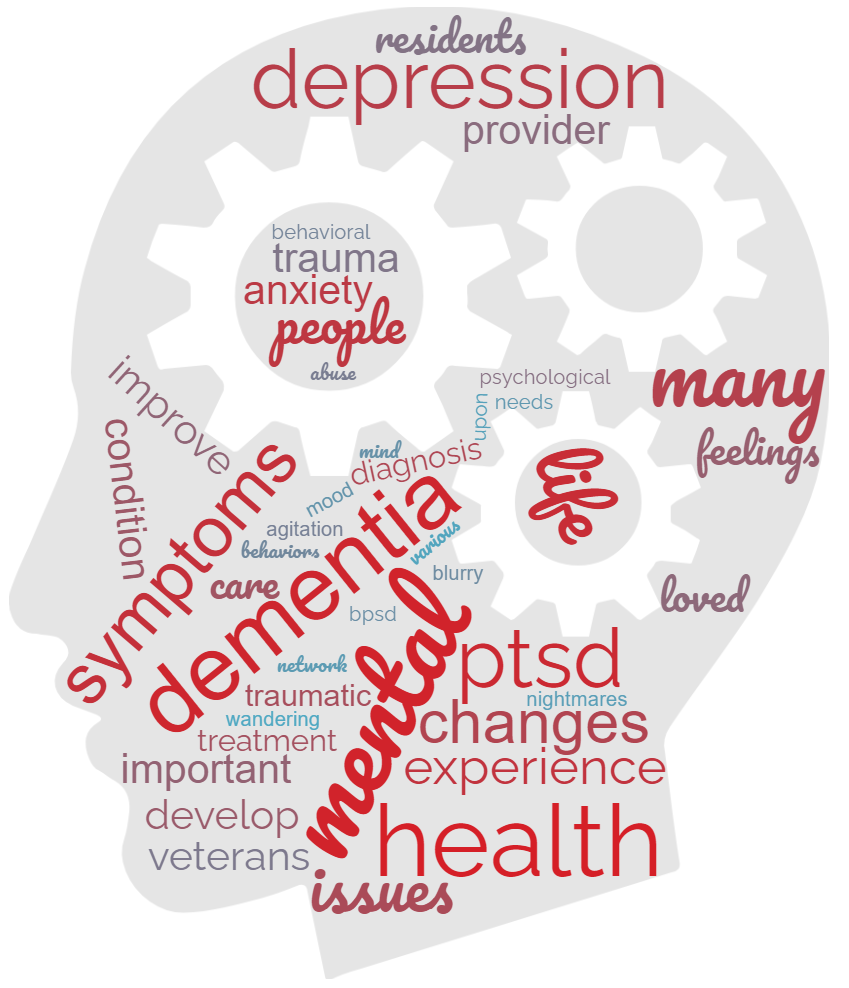Mental Health, Dementia, and PTSD

Director of Resident & Family Services
Silverado Red Rock community
Silverado Red Rock community
As people age, they may experience certain life changes that impact their mental health, such as coping with a serious illness or losing a loved one. Although many people will adjust to these life changes, some may experience feelings of grief, social isolation, or loneliness. When these feelings persist, they can lead to mental health issues, such as depression or anxiety.
Mental health is important in every stage of life. Effective treatment options are available to help older adults manage their mental health and improve their quality of life. Recognizing the signs and seeing a healthcare provider are the first steps to getting treatment. It is common for people with dementia to experience anxiety, depression, or apathy. Improving the mental health of someone with dementia can improve their overall quality of life. When we speak about mental health many shy away as the stigma continues to prevail in our train of thought. But it is a subject that needs to be discussed as many suffer from various forms of mental health issues. One mental health issue not many truly understand is PTSD. Post Traumatic Stress Disorder is a condition where you experience some symptoms such as difficulty controlling your emotions and feeling very angry and distrustful towards the world.
It is caused by living very traumatic experiences. Symptoms of PTSD include flashbacks, where a person relives the traumatic event in some manner, reoccurring memories or nightmares are also a sign.
 PTSD occurs when symptoms from psychological trauma disrupt daily functioning. Almost 1/3 of Americans are suffering from clinical symptoms of depression or generalized anxiety. The risk, ironically, is higher among non-military civilians. Veterans with PTSD were 2x times more likely to develop dementia than veterans without PTSD.
PTSD occurs when symptoms from psychological trauma disrupt daily functioning. Almost 1/3 of Americans are suffering from clinical symptoms of depression or generalized anxiety. The risk, ironically, is higher among non-military civilians. Veterans with PTSD were 2x times more likely to develop dementia than veterans without PTSD.
People with PTSD in the general population have issues related to physical and sexual abuse, the threat of death, car accidents, terrorism, or other trauma were more than twice as likely to develop dementia than others with no diagnosis. Add Dementia to this equation and their world gets even scarier and blurry. These symptoms are often labeled as behavioral and psychological symptoms of dementia (BPSD) and encompass a broad range of symptoms related to mood changes such as depression and anxiety, psychosis, and inappropriate behaviors such as wandering, shouting and agitation.
In honor of mental health awareness, it is noteworthy to be transparent and educate people on the importance of diagnosis and treatment, so that individuals with dementia can have some peace. Looking at our residents at times involves doing that deep dive and pairing the mental health diagnosis with the existing dementia condition. It is important that we as health care providers realize the intricate network of damage that PTSD and Dementia inflict upon some of our residents. Some days they are so confused and lost in the shadows of their mind. So be easy on them as life has already given them much to cause pain for an eternity. So be mindful that some days, they will not know what happened with their loved ones who have either passed on or are no longer involved in their life- while other days they might give some clarity and be able to realize what happened. Some days they may respond to the truth well- other days they will experience meltdowns… that’s PTSD in a nutshell. So when they come to you as a provider of care, read their body language, and go along with it… gauge your response to their questions with trepidation, and based on how they present themselves for that window of time, collect your responses and be gentle.
Mental health is important in every stage of life. Effective treatment options are available to help older adults manage their mental health and improve their quality of life. Recognizing the signs and seeing a healthcare provider are the first steps to getting treatment. It is common for people with dementia to experience anxiety, depression, or apathy. Improving the mental health of someone with dementia can improve their overall quality of life. When we speak about mental health many shy away as the stigma continues to prevail in our train of thought. But it is a subject that needs to be discussed as many suffer from various forms of mental health issues. One mental health issue not many truly understand is PTSD. Post Traumatic Stress Disorder is a condition where you experience some symptoms such as difficulty controlling your emotions and feeling very angry and distrustful towards the world.
It is caused by living very traumatic experiences. Symptoms of PTSD include flashbacks, where a person relives the traumatic event in some manner, reoccurring memories or nightmares are also a sign.
 PTSD occurs when symptoms from psychological trauma disrupt daily functioning. Almost 1/3 of Americans are suffering from clinical symptoms of depression or generalized anxiety. The risk, ironically, is higher among non-military civilians. Veterans with PTSD were 2x times more likely to develop dementia than veterans without PTSD.
PTSD occurs when symptoms from psychological trauma disrupt daily functioning. Almost 1/3 of Americans are suffering from clinical symptoms of depression or generalized anxiety. The risk, ironically, is higher among non-military civilians. Veterans with PTSD were 2x times more likely to develop dementia than veterans without PTSD.
People with PTSD in the general population have issues related to physical and sexual abuse, the threat of death, car accidents, terrorism, or other trauma were more than twice as likely to develop dementia than others with no diagnosis. Add Dementia to this equation and their world gets even scarier and blurry. These symptoms are often labeled as behavioral and psychological symptoms of dementia (BPSD) and encompass a broad range of symptoms related to mood changes such as depression and anxiety, psychosis, and inappropriate behaviors such as wandering, shouting and agitation.
In honor of mental health awareness, it is noteworthy to be transparent and educate people on the importance of diagnosis and treatment, so that individuals with dementia can have some peace. Looking at our residents at times involves doing that deep dive and pairing the mental health diagnosis with the existing dementia condition. It is important that we as health care providers realize the intricate network of damage that PTSD and Dementia inflict upon some of our residents. Some days they are so confused and lost in the shadows of their mind. So be easy on them as life has already given them much to cause pain for an eternity. So be mindful that some days, they will not know what happened with their loved ones who have either passed on or are no longer involved in their life- while other days they might give some clarity and be able to realize what happened. Some days they may respond to the truth well- other days they will experience meltdowns… that’s PTSD in a nutshell. So when they come to you as a provider of care, read their body language, and go along with it… gauge your response to their questions with trepidation, and based on how they present themselves for that window of time, collect your responses and be gentle.


